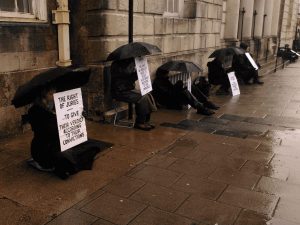The UN Human Rights Council passed its first ever resolution on Thursday 4 April over tackling discrimination against intersex people, despite opposition from several countries to the terminology used. The resolution passed in the 47-member council with 24 votes in favour, none against and 23 abstentions.
Intersex people: combatting persecution and discrimination
Around 1.7% of the population are intersex. In the UK there are 1.1 million intersex people – three times more than the trans population. As the University of Manchester wrote:
The term ‘intersex’ covers more than 40 variations in a person’s physical sex characteristics. These variations may relate to a person’s internal or external genitalia, chromosomes and/or hormones.
Yet intersex people face systemic discrimination. So, the UN resolution was long overdue.
Argentina, Brazil, France, Germany, India, Japan, and the US were among the countries voting Yes. Bangladesh, China, Indonesia, Malaysia, Qatar, and the United Arab Emirates abstained.
The resolution, entitled “Combating discrimination, violence and harmful practices against intersex persons”, was brought forward by Australia, Chile, Finland, and South Africa.
South Africa’s ambassador Mxolisi Nkosi said:
The resolution seeks to create awareness of the plight of intersex persons. Intersex persons face lifelong discrimination in various areas of their lives, including in sports, health, and education.
In extreme cases, this leads to violence and harmful practices such as forced castration, forced sterilisation and even infanticide.
France’s ambassador Jerome Bonnafont welcomed the council discussing the situation of intersex people for the first time, saying they were “too often the victims of rejection, by their family or society”.
US ambassador Michele Taylor called it a “landmark resolution” and a “historic juncture” for the UN’s top rights body.
The resolution recognises that persons:
with innate variations in sex characteristics, that is persons who are born with sex characteristics that do not fit typical definitions for male or female bodies, including sexual anatomy, reproductive organs and hormonal or chromosome patterns (also known as intersex persons) exist in all societies.
Quibbling about terminology – or just discrimination?
Some countries predictably pushed back. Qatar’s representative, speaking for the Arab Group members of the council, said they had presented constructive ideas “to make the text more balanced”:
The Human Rights Council is not the right platform for discussing this complex issue, especially given the medical aspects.
We wanted to change intersex persons to another description: persons with disorders in sex development. For us, this is the more scientific and medically appropriate description.
Many intersex people would rightly object to the idea that they are somehow living with a disorder that needs to be corrected.
Meanwhile, Bangladesh said the term intersex was “unknown in the national legal systems and social contexts of many member states”, and the resolution “offers a vague and arbitrary definition of intersex persons”.
Malaysia said the term intersex “is not universally recognised” and when translated into local languages could be derogatory and “do more harm than good”. China said the resolution should respect traditions in various countries.
Long overdue for intersex people
The resolution recognises that intersex persons “may face multiple and intersecting forms of discrimination in all areas of life”, and voices grave concern about the “violence and harmful practices” they face, “including medically unnecessary or deferrable interventions, which may be irreversible”.
The resolution encourages states to enhance efforts to combat discrimination, violence and harmful practices, “such as stereotypes, the spread of misconceptions and inaccurate information, stigma and taboo”.
Civil society groups welcomed the move. ILGA World is the international lesbian, gay, bisexual, trans, and intersex association. It and 34 other groups commented:
This resolution marks yet another milestone in how international bodies are looking at the rights of intersex persons.
Over the years, the work of civil society and States alike has built tremendous momentum, but things could take an even more decisive turn this time. Thanks to this vote, the first-ever official United Nations report to address the human rights situation of persons with innate variations in sex characteristics will raise awareness of the issue in a way that States can no longer ignore, and will have to act upon.
Additional reporting via Agence France-Presse
Featured image via Wikimedia




